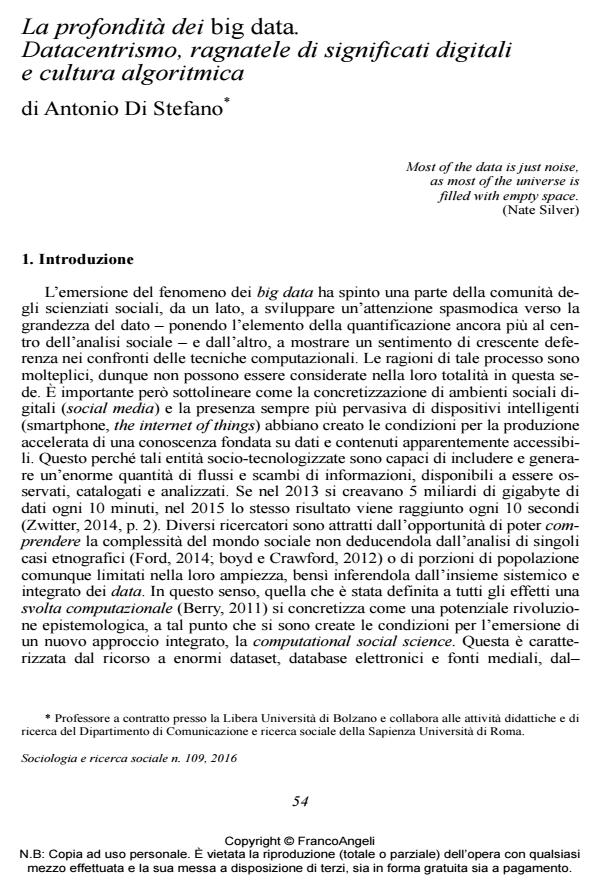La profondità dei big data. Datacentrismo, ragnatele di significati digitali e cultura algoritmica
Titolo Rivista SOCIOLOGIA E RICERCA SOCIALE
Autori/Curatori Antonio Di Stefano
Anno di pubblicazione 2016 Fascicolo 2016/109
Lingua Italiano Numero pagine 16 P. 54-69 Dimensione file 97 KB
DOI 10.3280/SR2016-109006
Il DOI è il codice a barre della proprietà intellettuale: per saperne di più
clicca qui
Qui sotto puoi vedere in anteprima la prima pagina di questo articolo.
Se questo articolo ti interessa, lo puoi acquistare (e scaricare in formato pdf) seguendo le facili indicazioni per acquistare il download credit. Acquista Download Credits per scaricare questo Articolo in formato PDF

FrancoAngeli è membro della Publishers International Linking Association, Inc (PILA), associazione indipendente e non profit per facilitare (attraverso i servizi tecnologici implementati da CrossRef.org) l’accesso degli studiosi ai contenuti digitali nelle pubblicazioni professionali e scientifiche.
The main objective of this paper is to describe and analyze the high cultural density and ideological character of the Big Data phenomenon. The technical nature of computational models and the affirmative logic of algorithmic culture conceal the functioning of the mechanisms, simultaneously symbolic and ideological, that contribute to structuring Big Data. As data, it represents the result of an intricate process of construction, imagination, and interpretation. On the other hand, the role played by powerful technological corporations and by a specific form of neoliberal state highlights only the exchange value of Big Data, the production of which is aimed to fulfil commercial and surveillance needs.
- Handbook of Research on Advanced Research Methodologies for a Digital Society Costantino Cipolla, pp.42 (ISBN:9781799884736)
- Gestão estratégica de grandes dados para tomada de decisão no setor público: o caso da Prefeitura do Rio de Janeiro Lucas Ferreira Braga, Ney Wagner Freitas Cavalcante, Elaine Tavares, Clarice Secches Kogut, in Caderno Pedagógico /2023 pp.3413
DOI: 10.54033/cadpedv20n8-020
Antonio Di Stefano, La profondità dei big data. Datacentrismo, ragnatele di significati digitali e cultura algoritmica in "SOCIOLOGIA E RICERCA SOCIALE " 109/2016, pp 54-69, DOI: 10.3280/SR2016-109006